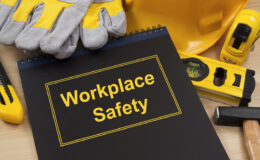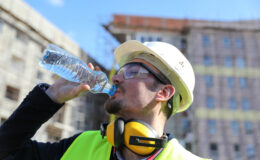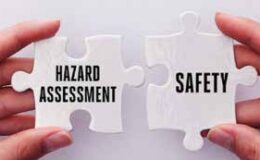By Chris Demeter, Senior Loss Control Consultant
How many of you remember your first paying job? My first job was at Kentucky Fried Chicken. At 16-years old, I was frying chicken in 350°F oil in a pressure fryer until golden brown. I do recall a few burns from splattering oil while performing my duties. Overall, the job was alright since I was able to eat all the chicken I wanted and I saved up enough money to buy my first car. It was a 1970 Ford Torino GT, in which I tended to have a lead foot that led to a few unwanted but deserved traffic tickets. According to my wife, I drive like a grandpa now so no more driving like that young inexperienced driver.
Young workers have high rates of job-related injury. According to the Department of Labor, in fiscal year 2020, teens age 15-19 were treated in the emergency room for a workplace injury approximately every 5 minutes. These injuries are often the result of the many hazards present in the places they typically work, such as sharp knives and slippery floors in restaurants. Young workers are at risk of workplace injury because of their inexperience at work and their physical, cognitive, and emotional developmental characteristics, and a lack of safety training also contribute to high injury rates. They often hesitate to ask questions and may fail to recognize workplace dangers. To help address this problem, MIOSHA enacted the Youth Employment Standards Act 90 of 1978. The Act defines a minor who is less than 18-years of age, including but not limited to employees, volunteers, independent contractors, and performing artists.
There are laws that protect teens from doing dangerous work. In Michigan, workers under 18 may not:
- Drive a motor vehicle as part of the job (pizza delivery, etc.).
- Drive a forklift.
- Use powered equipment like a circular saw, box crusher, meat slicer, or bakery machine.
- Work in wrecking, demolition, excavation, or roofing.
- Come in contact with hazardous substances, chemicals, explosives, or radioactive substances.
- Work in logging or sawmill.
- Perform brazing, welding, soldering, or heat treating, for those less than 16 years of age.
Restricted Work:
Special approval for some restricted work for 16- and 17-year-olds may be authorized. Employers must apply for special approval to the Michigan Department of Education (MDE) /Office of Career & Technical Education.
Minors under 18 years of age must obtain a work permit or a written agreement or contract entered into between the employer and the governing school district, public school academy, or non-public before starting work. Work permits can be obtained from the state of Michigan school issuing officer (the chief administrator of a school district, intermediate school district, etc.) the minor attends or the school district where the minor will be employed. If the minor changes jobs, a new work permit is required for the new employer. A work permit may be revoked for poor academic performance. A work permit is required even if the minor is home/cyber/virtual/online schooled, does not attend school, or out-of-state resident. Work permits are no longer available for bulk purchase from Michigan Center for Career & Technical Education; work permits are available for printing or download below. Note: CA-6 work permits must be printed, front and back, on pink paper and CA-7 work permits must be printed, front and back, on yellow paper to be valid.
Contact: Email: WHinfo@michigan.gov
Phone: 517.284.7800
Fax: 517.763.0110
Send forms to:
Wage and Hour Division
ATTN: Jennifer Fields
Michigan Department of Labor and Economic Opportunity
P.O. Box 30476
Lansing, MI 48909-7976
Who Needs A Work Permit (Including Summer)
Minors under the age of 18 cannot be employed or permitted to work, with or without pay, or volunteer until the person, company, business, firm, or corporation proposing to employ the minor obtains and keeps on file at the minor’s place of employment (work location) a current and valid age and color appropriate work permit, which has been issued by a state of Michigan issuing officer of the school district, intermediate school district, public school academy or non-public school before starting work. Compulsory School Attendance “…The law in Michigan governing compulsory attendance requires a parent, legal guardian, or other person having control or charge of a child… who was age eleven before that date and entered grade 6 in 2009 or later shall attend school from age six to eighteen…” Whether minor is:
- homeschool
- cyber school
- virtual school
- online school
- obtaining G.E.D.
- out-of-state resident
- not attending school
Minors under the age of 18 are required to have a work permit before starting work. If a minor comes from another state to work in Michigan, the minor should bring a certified birth certificate and an unofficial transcript from the out-of-state school attended which includes the school’s complete name, address, city, state, zip code, county, and telephone number.
How To Obtain A Work Permit
The minor first must go in-person to a state of Michigan school district, intermediate school district, public school academy, or non-public school official designated as an issuing officer and provide one of the following acceptable forms of evidence of age. Minors seeking employment who are homeschooled shall be issued a work permit by the state of Michigan issuing officer of the school district, intermediate school district, public school academy, or non-public school in which the minor’s residence or prospective employer is located. The minor must present a signed, written statement from the parent or guardian, as the instructor of record, indicating how many hours per week the student is being homeschooled (Non-public and Home School information). The state of Michigan issuing officer will attach the parent/guardian statement to the work permit and keep a copy of the statement with their copy of the work permit filed at the school.
- A certified copy of a birth record or other proof of age showing the place and date of birth
- A certified copy of valid operator’s license issued by this state showing date of birth
- The school record or the school census record
- The sworn statement of the minor’s parent/ guardian and a statement from a physician
The minor and parent/guardian must complete Section I of the work permit in its entirety (all areas must be completed). The minor then takes the work permit to the employer after completing Section I, and the employer must complete Section II of the work permit, in its entirety (all areas must be completed including listing all work the minor will be performing, equipment and/or tools minor will use, starting and ending hours to be worked, number of days per week to be worked and number of hours per days to be worked, etc.). The minor must take the work permit, after the employer has completed Section II, in-person to a state of Michigan school district, intermediate school district, public school academy, or non-public school official designated issuing officer for review and to complete section III. The issuing officer must copy the work permit and place the work permit in the minor’s permanent school file and return the original work permit to the minor. The minor must give the original work permit (after the designated official issuing officer has reviewed and approved by signing and dating) to the person, company, business, firm, or corporation before the start of work which is kept on file at the minor’s place of employment.
Occupational health and safety education is the key to preventing injury among working teens, and it provides them with important job and life skills they need, now and in the future. Although workplacespecific training is critical, young people also need to learn and practice general health and safety skills that they will carry with them from job to job. Teens should be able to see the hazards in any workplace. They should understand how hazards can be controlled, what to do in an emergency, what rights and responsibilities they have on the job, and how to speak up effectively when problems arise at work.
Hiring teens can be complicated; please take the time to make certain you are following the guidelines mentioned above and to ensure the young worker goes home safely. A folder called “Guidelines for Temporary and Teen Workers” can be found on the MTMIC client portal through our website: http://www.mtmic.com This folder contains a plethora of information regarding Temporary and Teen Workers. Please contact Patty Allen at patricia. allen@mtmic.com or 248.715.0013 for access to the MTMIC client portal. If you have specific questions, do not hesitate to contact your Loss Control Consultant. I hope you are enjoying the milder weather and we will get ready for the hot days of summer.






